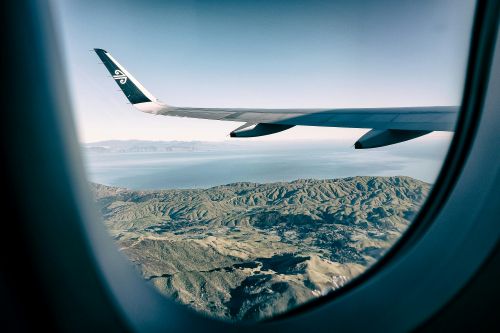 Air New Zealand’s new Chief Executive Nikhil Ravishankar started in his role this month. In reflecting on the “complicated” times that the airline is operating in, he commented that it was more cost effective to keep employees on the payroll than to make people redundant. He said that the airline had learnt a very bitter lessen through Covid. He said that in "some of these workforces, it takes years to retrain. In the case of, say, an aircraft engineer, that's a six-year apprenticeship program. And so, yeah, we are carrying more labour than we might require."
Air New Zealand’s new Chief Executive Nikhil Ravishankar started in his role this month. In reflecting on the “complicated” times that the airline is operating in, he commented that it was more cost effective to keep employees on the payroll than to make people redundant. He said that the airline had learnt a very bitter lessen through Covid. He said that in "some of these workforces, it takes years to retrain. In the case of, say, an aircraft engineer, that's a six-year apprenticeship program. And so, yeah, we are carrying more labour than we might require."
On an everyday level, Air New Zealand is used to operating in a “complicated” environment. The recent decision on an unlawful discrimination claim by Captain Garth McGearty shows how difficult it is to navigate the “air bumps” of lawful and unlawful age discrimination.
McGearty had a distinguished flying career, reaching the most senior rank as a captain in Air New Zealand’s Boeing 777 fleet. He turned 65 in July 2017. When pilots reach that age their options for international commercial flying are restricted by international law, whereas they are not restricted in the same way in New Zealand and some other countries that Air New Zealand flies to.
Air New Zealand and two pilot unions have tried to navigate these complexities, balancing international legal restrictions, New Zealand’s anti-discrimination laws and conflicting interests between pilots aged over 65 (ARPs – age restricted pilots) and their younger counterparts; the ARPs wishing to continue their flying careers and keeping their higher salaries, while the younger pilots being keen to keep progressing their careers as senior pilots retire or opportunities arise because of the international legal restrictions.
This has evolved over time in the applicable collective employment agreements (CEA) that cover the parties. In practical terms it usually means moving to the A320 fleet, with a reduction in base pay of about $80,000 a year.
Air New Zealand wrote to Captain McGearty one year before he turned 65, regarding the options available to him under the CEA. McGearty seems to have taken a long time to respond before it became formally known that his preference was to continue flying on the B777 fleet as he did not believe that the international restrictions were such that he needed to make a choice under the CEA.
While Captain McGearty took some extended leave when he reached 65 Air New Zealand set up a modelling trial with the various unions and rostering committees to ascertain whether it would be possible to accommodate ARPs on the B777 and B787 fleets. It concluded that it was possible but there would be an effect on other pilots. With that finding Air New Zealand commenced a consultation process with the two unions with a view to attempting to agree the terms of a trial. Her Honour Kathyrn Beck, the Employment Court Judge, commented "it is fair to say that discussions were not easy".
When Captain McGearty returned back to work in May 2018, he was not rostered back on in his normal role. He continued to be paid, but without incentive pay, until he went on unpaid leave later that year. Captain McGearty then raised personal grievances for disadvantage and discrimination on the grounds of age.
Captain McGearty had several years experience on the international pilots rostering committee and had assisted on projects involving the development of new rostering systems. He believed he could continue to be rostered on the B777. He said Air New Zealand does make individual allowances when rostering for pilots, for example those pilots that were pregnant or with young families when the Zika virus was a concern.
The real issue before the Employment Court was whether the discrimination was unlawful, or lawful based on an exception in the Acts relating to a “genuine occupational qualification” – a term that is not defined. That term in itself is subject to another exception, that an employer must make some adjustment to the activities of the employer provided that they do not involve an unreasonable disruption to the activities to the employer.
Air New Zealand claimed that the international restrictions were a genuine occupational qualification which entitled it to treat Captain McGearty differently on the basis of age. It said that it had implemented reasonable accommodations which had been operating, with agreement with the union, for over a decade prior to Captain McGearty's claim.
Judge Beck commented that "I am alive to the fact that the problem was bigger than Captain McGearty. Air NZ needed to take steps to address those issues with the unions and its employees with a view to finding a more permanent solution, particularly given the strength of feeling around the issue. However, that did not preclude it from resolving Captain McGearty's individual situation in the interim when it had clearly been put on notice of his claim of discrimination".
Her Honour held that Captain McGearty had been disadvantaged and unlawfully discriminated against on the basis of his age by the unjustified actions of Air New Zealand.
While the Employment Court ultimately decided the case in Captain McGearty’s favour, it should be commended for its efforts with the unions to navigate the complex legal framework it operates in. Similarly, it should be commended for recognising the value of its staff while in navigates “complicated times” at present. Read more...

